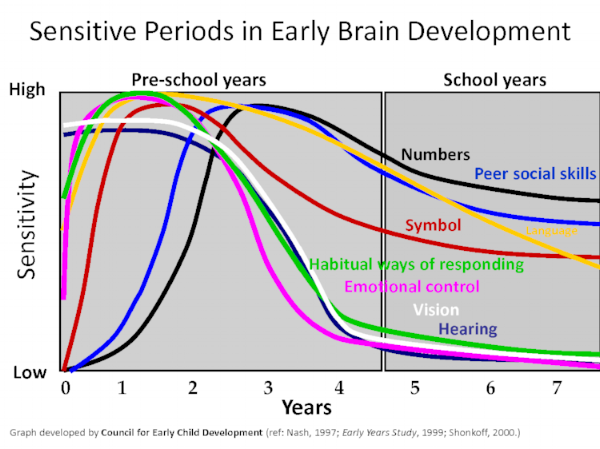An enormous amount of brain development occurs during infancy (0-3 years old) (See the chart below) . For this reason, experts agree it is crucial that parenting arrangements provide a child with the best chances of healthy development.
Young Children In Divorce & Separation provides training programmes about early development and the needs of very young children in separation.
There is as yet no consensus on what is the best parenting arrangement. Some think it is beneficial for infants to have overnight stays at both parents’ houses, while others think this may cause too many risks. Long-term studies directly comparing different parenting arrangements for children raised in two houses from a young age are needed to help resolve what is the best arrangements. Read below for some details about ‘the case for’ and ‘the case against’.

The Case Against Overnights
The stance against overnights has principally been informed by John Bowlby’s attachment theory which suggests infants can have only one primary care giver and being separated from this caregiver can have adverse effects.
Australian research has found shared overnight care of young children, particularly infants, can negatively impact on the emotional and behavioural wellbeing of the child. However, these signs of emotional distress are not observed in children ages 4-5. It appears that by this age, most children are better developmentally prepared to do well in shared parenting arrangements.
Due to this, Sroufe & Mcintosh have suggested that equal numbers of overnights away from the primary carer should not occur before the age of 3.
The Case For Overnights
Neilsen has come forward criticising the methods used by previous studies that suggested these risks.
Evidence has also contested Bowlby’s original theory, leading researchers to conclude it is possible for infants to have a “multiplicity of figures for secure-base support”.
New empirical data demonstrates further evidence for the benefits of equal overnights. This research places emphasis on the long-term rather than short-term effects on parent child-relationships:
- Equal numbers of overnights (at each parents’ home) was associated with long term benefits for parent-child relationships with both parents
- Benefits in mother-child & father-child relationships were observed in overnights even when children were two years old and under the age of one
- These benefits were noticed regardless of whether parents initially agreed or disagreed about overnights
- Young adults who had more overnights with both parents felt closer to their parents and were more likely to remember their parents as having been warm and responsive during their childhood
Warshak’s review of the literature suggests it is favourable for young children to have an even balance of time and contact between the homes of separated parents.
He concludes that the considerations favouring overnights for most young children to be more compelling than concerns that suggest that overnights might negatively impact a child’s development.
He also argues that child developmental theory and data demonstrates that infants normally form attachments to both parents & long periods of absence threatens the security of the attachments between a parent and child.
A Middle Way?
McIntosh’s summary on the previous literature suggests that although studies support a caution about high frequency of overnight care for very young children, it also does not support arguments against any overnight care. This suggests is that the right amount of overnights is different in every family.
Researchers have argued healthy development in the young child depends on the capacity of caregivers to
- protect the child from physical harm and undue stress by being a consistent, responsive presence
- stimulate and support the child’s independent exploration and learning and the process of discovery
So, parents must provide both continuity in and an expanding care giving environment to ensure the secure development of their infant and where possible, organised caregiving with more than one caregiver is advantageous.
The following recommendations are suggested by McIntosh, Pruett & Kelly for determining if/how many overnights are beneficial for a child:
Factors In Deciding Levels Of Overnight Care
- The child’s safety with each parent, and parents safety with each other
- The child’s trust and security with each parent
- Parent mental health
- The young child’s health and development
- The young child’s behavioural adjustment
- Qualities of the co-parental relationship
- Pragmatic resources
- Family factors: extended and cultural
‘Gateway’ Assumptions
These must be met before moving onto deliberations about overnight time:
- The young child is safe with, and can be comforted by, both parents
- The young child is protected from harmful levels of stress.
If these are met parents should make plans that:
- Support the development of organised attachments to each parent/caregiver
- Encourage parenting interactions that support the development and maintenance of attachments with each parent
- Provide the young child with support to transition between parents
- Reflect practical considerations
- Maximise the amount of time the young child is cared for by a parent in person
- Encourage shared decisions about major child-related issues